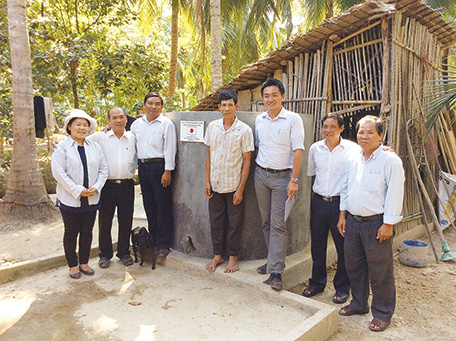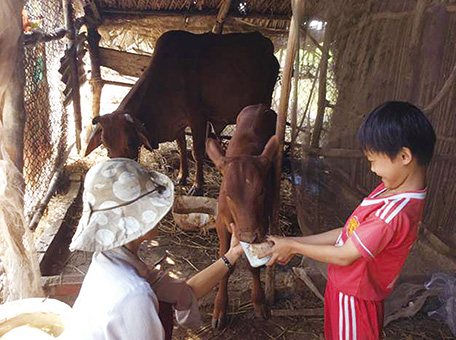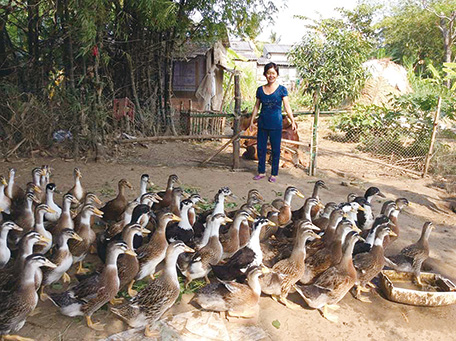Stories from the field 03
Overcoming Poverty, Starting with 25 Ducklings
– Helping the Poor in Viet Nam with a Duck Bank

Ms. Ino (farthest to the left) and members of the Chau Hung Village Community Building Committee visit a family that has received water storage tank assistance. (Photo: Mayu Ino)

The Guen family in the Thanh Phuoc Village takes good care of their cows. (Photo: Mayu Ino)
Viet Nam has implemented the Doi Moi Policy in an effort to transition from a centrally-planned economy to a market economy since 1986. In the field of agriculture, Viet Nam has drastically improved production yield by improving the production motivation of individual farmers. However, among farmers the gap between the poor and wealthy has widened.
Since the enforcement of the 1993 Land Law, farmers have been able to purchase and sell land (land-use rights), but the number of “landless people” has risen. This term refers to people who have lost their land due to illness, natural disaster, or the bankruptcy of their farm. These people make a living through day labor and most are considered poor per the standards set by the Government of Viet Nam (monthly household income of less than $20).
Providing assistance based on the real needs of the poor
Seed to Table, an NGO in Japan, partnered with the Government of Japan to begin initiatives in Viet Nam in order to help landless people increase their income and overcome poverty in November 2012. The name of this project is “The Project for Improving Livelihood of the Poor by Applying Sustainable Agriculture Technology” and it utilizes Grant Assistance for Japanese NGO Projects.1 The target area for this project is Binh Dai District in Ben Tre Province, which is located at the lower reaches of the Mekong River. This area has a high percentage of landless people and there are poor people living here who suffer from disabilities resulting from the spraying of Agent Orange in the area during the Viet Nam War.
Ms. Mayu Ino, Chief Representative of Seed to Table, visited poor households in Binh Dai District to try to identify approaches to “sustainable agriculture” that they could implement.
“The Government of Viet Nam has committed a large amount of money over the years to fighting poverty. However, when I visited poor households that do not own land, even if vast sums of money were loaned out by the government, these funds would be used by locals to repay debts or for medical expenses, meaning it would not work as a means for increasing income. Therefore, assistance needs to be based on the real needs of the poor.”
This is why Ms. Ino and Seed to Table decided to work on a “Duck Bank.” One household was loaned around 25 ducklings that they could raise to become full size ducks to be sold at the market, with the proceeds used to repay the cost of the ducklings. If all of the ducklings were raised and sold, the household would receive around ¥10,500 in proceeds. This amount, less the cost of the ducklings, which is ¥1,600, and the cost of feed, would become the household’s income. Ducks can be raised in a garden, making it possible even for people who do not own land.
Households that had success raising ducks are also given the opportunity to use the “Cow Bank” where calves are lent out using the same system as the Duck Bank. Furthermore, these households receive assistance in setting up simple water storage tanks to ensure the required supply of fresh water is available during the dry season when there is no rainfall.
The Duck Bank is operated by the Commune Development Committee, which is comprised of the deputy mayor of the village, the representative of the community, and agriculture extension workers. The committee compiles a list of targeted poor households and from this list selects the households that can raise ducklings.
Participating households sign a pledge. They also undergo three forms of training to learn about how to raise ducks and manage records. Every month these households attend meetings where they report on the status of their duckling raising while learning with other program participants. They also agree to repay the cost of the ducklings in four months’ time. The ducklings are sent to each household from the Agriculture Promotion Centre which marks the beginning of the duckling raising process. The Commune Development Committee periodically visits participating households to monitor the situation. Ms. Ino also visits the villages roughly once every month.
The introduction of incentives achieved a shift in mindset among participants
During the first fiscal year around 120 households from five villages participated, but only around 30% of these turned a profit. Ms. Ino visited the households who were unable to turn a profit to determine the cause.
“In most cases, the households that did not make any money were those who did not attend the preliminary training and did not keep records of the cost of feed. Even if I instructed them to keep a journal, they persistently told me that they could not, since they could not write. On top of that, some households claimed the ducklings died because they were unhealthy in the first place, so they would not return the cost of the ducklings.”
What made the difference with households who were able to turn a profit? The training teaches participants how to properly raise the ducklings. The key point is getting the feed right. If only commercial feed is used then the cost of feed will balloon, resulting in no profits. The training course imparts in participants the know-how needed to raise ducks wisely while saving on feed costs by mixing in banana tree bark, aquatic plants, or crab or shrimp meat.
It is also important to keep records. There were households that were able to turn a profit even though both the husband and wife could not read or write. They were able to write only numbers, so they were able to properly manage the duckling costs, feed costs and the proceeds of sales from the mature ducks.
Ms. Ino decided on a plan to provide incentives to households that had success. She gave them priority in borrowing calves from the Cow Bank, which was open only to a few people in the villages, and also to borrow more ducks in order to expand their scale of duckling-raising operations.
Once these incentives were started, a change appeared in the attitude among the households that until then had complained about unequal treatment. They attended the training and meetings to gain the know-how of households who were doing a good job and also began keeping proper records. They shared the same determination to overcome poverty, and the reason for the change in behavior was that they realized that without getting serious they could not obtain a water tank or cows.
Ms. Ino says, “It was an amazing change. Instead of receiving a handout from the government or an NGO, this change involved people using their heads and hands to work towards overcoming poverty. I was reminded once again just how important it is to link assistance with voluntary actions.” These measures bore fruit and in the second year of the project some 70% of the households were able to turn a profit, including those that were not able to do so in the first year.
Promoting the project through assurance gained from the field

Ms. Diep of the village of Dai Hoa Loc brought herself out of poverty by raising ducks. (Photo: Mayu Ino)
When the project initially began, Ms. Ino was told by an official of the Ben Tre Agricultural Promotion Centre, “There is no way that we can solve the problem of poverty with just 25 ducklings.” However, once the livelihoods of poor households began to improve, the assessment of the project began to change.
In February 2014, Mr. Vo Thanh Hao, Chairman of the People’s Committee of Ben Tre Province, who is equivalent to a prefectural governor in Japan, visited the villages where the Duck Bank was being used. Until visiting in person, the top leader of the province’s government administration had said, “I could not believe that a household can overcome poverty with just 25 ducklings.” However, he changed his mind after visiting and talking to a household that had purchased 5,000 square meters of land from the proceeds gained from raising ducks.
After completing his tour, Mr. Hao told Ms. Ino, “I was convinced that poverty reduction does not always require a huge budget. I now understand that having poor families take the lead through small efforts in their daily lives, and then gradually scaling these up, is a more effective means for them to overcome poverty.”
Later, Ben Tre Province provided subsidies to fund the necessary costs of the Commune Development Committee running the Duck Bank and began considering expanding these activities to other areas of the province.
In 2015, the final year of the project, nearly 90% of the households using the Duck Bank in the targeted five villages is expected to turn a profit, and between 20% and 30% of the participating households will be able to escape from the ranks of the poor (monthly income of $20 or less). This initiative has also been started in two additional villages. “There are some things you do not know until you actually visit the homes of the poor. It is important to go into the field and see for your own eyes the situation on the ground to gain assurance. This assurance is what allows you to promote a project with confidence,” says Ms. Ino about the results.
Seed to Table is committed to continuing with its activities in Viet Nam. After the project ends, Ms. Ino will continue to visit each of the villages to provide NGO assistance while valuing the assurance that can only be gained from the field.
*1 Grant Assistance for Japanese NGO Projects is a scheme by which the Ministry of Foreign Affairs offers funding cooperation for economic development projects and emergency humanitarian projects carried out by Japanese NGOs in developing countries and regions. The goal of this scheme is to enhance the capabilities of NGOs in expanding their international activities by helping them accumulate more experience.
<< Previous Page Next Page >>
Main Text | Statistics and Reference Materials | Stories from the field | Master Techniques, From Japan to the World | ODA Topics
